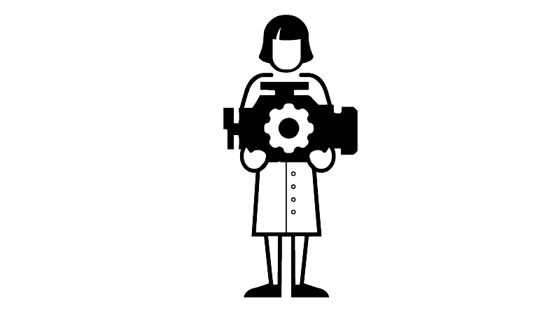Games
Engine programmer

What does an engine programmer do?
Engine programmers develop the game engine from which the game runs. They create new functionality in the engine and rewrite the existing systems to make them as efficient as possible. When a new game is being devised, the engine programmer will figure out how to create the best engine for that particular game. They also fix bugs and deal with any technical glitches along the way.
What is an engine programmer good at?
- Maths: be skilled in calculus, algebra, and statistical theory
- Knowledge of games engines and platforms: understand graphic integration, collision detection, data transformation, database management
- Programming: be skilled in programming for the central processing unit (CPU) core
- Innovation: spot problems with the game engine and find solutions
- Communication: listen to the people working on the game, understand their problems, share the solutions and write technology documentation
Who does an engine programmer work with?
Engine programmers will work with everyone who uses the engine – the designers, artists and programmers. They work closely with testers to improve the engine and report to the lead engineer.
How do you become an engine programmer?
Engine programmers typically have several years’ experience in games development. They understand the needs of animators, VFX artists and physics programmers alike so they need an all-round understanding of how games are made. Working as a QA technician is a good way of getting into the industry and learning about the things that can destabilise a game. But that is not a substitute for a degree in computer science or programming.
At school or college:
Take A-levels or Highers in maths, physics and computer science. Or you might could do a BTEC Diploma/Extended Diploma in Computing
Make some games:
Build a portfolio to show to admissions tutors and employers. Make sure you modify the engine in some way and be able to explain what problem you were solving and why.
Build a portfolio:
Learn how to use game engines and different 2D and 3D animation and modelling software, experiment and start creating work that you can show to admissions tutors or employers. This is essential. Go to Build your games portfolio to learn how.
Get a degree:
Get a degree in physics, computer programming, game development or maths. Have a look at ScreenSkills’ list of recommended courses in games. We recognise courses with our ScreenSkills Select award where they offer training in the relevant software, dedicated time to building a portfolio and have strong links with the games industry.
Network:
Get to know people in the games industry by attending events, including games conferences and expos. Meet professionals and ask them questions about their work, while demonstrating interest and knowledge in the industry. Offer to provide them with your professional contact details and try to stay in touch with them. Go to Network well to learn how to do this.
Search for jobs:
If you already have experience as a games programmer or artist, use the UK Games Map to find out if there are games companies near you. Then go to their websites directly and check out their open roles.
You might also be interested in…
Being a graphics programmer, gameplay programmer, physics programmer, artificial intelligence (AI) programmer, virtual reality (VR) programmer, tools engineer or a network programmer in the games industry. You might also be interested in being a software developer in visual effects (VFX). Alternatively, you could consider a technical director (TD) role in VFX or in the animation industry.






